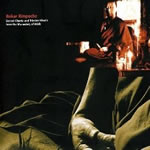|
|
 |
Dusted Reviews
Artist: Bokar Rimpoche Album: Sacred Chants and Tibetan Rituals from the Monastery of Mirik Label: Sub Rosa Review date: Aug. 5, 2008 |

|
|
|
 |
I couldn’t help but wonder about the implications of reviewing Sacred Chants and Tibetan Rituals from the Monastery of Mirik. There’s a part of me that wonders whether the language of music criticism can say much about it: how will its lazy descriptors function in relation to something many would think exists outside of its traditional purview? More importantly, how to avoid the near-inevitable processes of Othering that go on in most (well-meaning) reviews of traditional music: the East, for example, is usually simplistically read as both super-technologically advanced, i.e. relentlessly futuristic, and mysterious, i.e. relentlessly exotic. No clues needed as to where people would place this disc of chants and rituals…
Though it’s not acknowledged on the front cover, this disc is the original soundtrack to Guy Maezelle’s film Bokar Rimpoche: Meditation Master. I’ve not seen the film, but two things strike me on listening to these recordings. Firstly, the incredible, cumulative intensity of the chants: the four-voice song, “Calling the lama from Afar,” garners its power from almost microtonal inflections that gain power incrementally, the minute detailing in the repetitions cranking up your engagement. It’s completely compulsive and hypnotic. There are several examples of solo singing as well, where simple, yearning melodies roll around tongue and lips.
Secondly, there’s the sheer beauty of the two musical pieces here. The snippet for ringing, resonant Tibetan bowls, too brief at under two minutes, reminds me of some of Kraig Grady’s explorations of the singing of bells. I can’t count the amount of times these kinds of zoned mappings of resonant bells and bowls are described as ‘ritual’ – here’s one of the sources for that referent. And there’s also the “Mahakala ceremony,” which moves slowly, gracefully, from sections of blown, epiphanic wind instruments and percussion that flits gracefully and pounds metrically in equal measure, and sections of chants, moving from compulsive to possessed, that burn with intensity. It’s staggering, and a reminder that the palliative Western pigeonhole of ‘hippie/Buddhist’ is far from the realities of the religion.
Indeed, listening to this reminds me of a recent incident, having found a batch of old LPs of Tibetan and Bhutanese rites, rituals, and folk songs at a record sale, sitting amongst some techno singles. When I plucked them out of the racks and handed them to the stall owner (an ex-DJ), he looked at them, smiled and said, “Yeah, I used to listen to this stuff to chill out.” When I got the records home, a friend said, “that stuff’ll be nice and calm,” and I thought, well… no, not really – a feeling confirmed by the overpowering force of the “Padmasmbava Prayer” and “Mahakala Prayer” found on one of those records. It’s as serious as your life, and as far from the stereotype of supplicating, genteel ‘world music’ as you could get. Part of that’s due to the overloading noise of those early field recordings, and in contrast, this Sub Rosa disc is clear as day. But what you might trade in for some of the brutality of early recording quality, you make up for in the complexity and detail of the devotionals and ceremonies.
By Jon Dale
|







